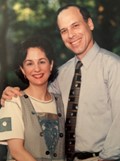What I Wish I Had Known Then and What I Know Now about Ethics Consultation
By Trudi Galblum, Director of Marketing
 The first sign that something was wrong were the headaches. Later it was an annoying habit of being late for everything, which was not like him.
The first sign that something was wrong were the headaches. Later it was an annoying habit of being late for everything, which was not like him.
I was clueless about all of it, more focused on our three children ranging in age from 12 to 21 and my work as a marketing and communications consultant for several Kansas City area nonprofit organizations.
In fact, the same morning my 47-year-old husband went to see a neurologist about the headaches, I was in a meeting joking with my colleagues that stress from work was finally getting to him.
Larry and I met the summer before our senior year of high school and probably would have married right away if not for our parents insisting that we finish college first. I majored in English. He majored in Chemistry. We married in May 1975, and he started medical school that fall.
Twenty-five years later, Larry was at the height of his career as a pathologist in a practice affiliated with a group of providers then known as Health Midwest.
Lesions in the Brain
When I got home from my meeting that morning in August 2000, I found Larry sitting on our bed staring out the window.
“I have lesions in my brain,” he said.
Later that day in the neurosurgeon’s office, I stared for the first time at brain scans of frontal and right parietal lobe tumors. Two days later, I waited for the diagnosis from surgery to debulk the frontal lobe tumor. Larry had hoped for the best – that the tumors would turn out to be a metastasis from another site – but suspected the worst. And he was correct. The diagnosis was glioblastoma, stage 4 brain cancer.
After he recovered from surgery, we traveled to MD Anderson in Houston to consult with a brain cancer specialist who offered a grim life expectancy prognosis of 12-to-18-months.
Hell no, we said. Larry started radiation while we searched for another doctor who would help us fight this thing.
Treatment Plans
After a more hopeful prognosis from the Brain Cancer Center at Duke University in Raleigh-Durham, NC, Larry decided to enter a clinical trial before pursuing standard of care treatment. Standard of care for glioblastoma at the time (and still largely today) was surgery to debulk the tumor followed by radiation (which he had completed) and chemotherapy in the form a pill known as Temodar. Larry thought it made sense to undergo the rigors of the clinical trial while he could still qualify and was still healthy enough to tolerate it.
It didn’t matter.
The tumors grew and the seizures continued. We switched to the standard drug Temodar and Accutane in February 2001 and, for several months, the tumors stopped growing. A brief remission of sorts. In April, Larry was just happy to be able to mow the lawn, ride his bike down the street, and travel with friends and our 12-year-old daughter to the Grand Canyon.
It was late August 2001, 12 months since diagnosis, when it became obvious that he was no longer in any kind of remission. We had sold our house in anticipation of me having to manage on my own. Larry was helping me move boxes into the new house when I found him standing in the driveway, lost and confused. We added tamoxifen, thalidomide and celebrex to the chemo mix, none of which helped.
More Clinical Trials
In December 2001, Duke offered two clinical trial opportunities. One involved traveling every three weeks to Duke. The other involved a two-phased surgery that would have required us to stay at Duke for at least a month. And, by the way, of the 12 patients who had undergone the trial to date, only two had stabilized. I didn’t ask what happened to the other 10.
By this time, Larry’s mental capacity was extremely compromised. The decision what to do next was mine to make. The Kansas City oncologist strongly urged me to go for the two-phased surgery at Duke in Raleigh-Durham. I was skeptical.
In happier times, when Larry and I had discussed what we would have wanted under such life-threatening circumstances, he told me not to worry, as if such circumstances could never happen to us. We never discussed an advance care plan, nor did anyone suggest that we do.
Case Study
I recently came across an August 2020 Case Study written by Ryan Pferdehirt, D.Bioethics, HEC-C, and Tarris Rosell, DMin, PhD, bioethicists at the Center for Practical Bioethics, where I have served as Director of Marketing and Communications since 2013.
The patient is a 44-year-old male, suffering from complications from an aggressive form of cancer. The patient’s condition has continued to worsen, with treatments not as effective as expected, and now expectations are low. The patient is non-responsive but does have a completed advance directive, which states that aggressive measures should cease if there is not a high expectation of meaningful recovery. It also lists his wife as surrogate decision maker, which she is doing. The patient is currently on GIP (general in-patient hospice).
It was recently brought to the surrogate decision maker’s attention that there is a new clinical research trial available that the patient would likely qualify for. The research is new, so the short-term and long-term risks and benefits are not fully known. While there is a possibility of improvement for the patient, there is expected to be discomfort and quality of life impacts. It is agreed that the likelihood of full recovery is low. The patient’s attending physician and oncologist agree that the research may be beneficial.
Initially, the patient’s wife agreed but after reflection is now stating that she is not sure if that is the right decision. The advance directive does not outline anything related to research. Since the patient has not expressed anything relating to research either, the patient’s wife is worried whether it is in his best interest and would he have agreed to participate.
The patient’s wife and attending physician are both requesting an ethics review.
The case is similar to my dilemma in December 2001 with two exceptions. First, the patient did have an advance care plan, even though it didn’t address research. Second, the patient’s wife and attending physician requested an ethics review.
Ethics Review
In 2001, I had never heard of ethics review, nor apparently had my physician husband. Indeed, it wasn’t until I started working at the Center for Practical Bioethics that I learned that The Joint Commission on Accreditation of Healthcare Organizations (JCAHO) requires hospitals to have a mechanism for addressing ethical issues in providing patient care and recommends a multidisciplinary ethics committee.
High-performing ethics committees have access to the services of a healthcare ethicist, which the American Society for Bioethics and Humanities defines as someone who…
…seeks to identify and support the appropriate decision maker(s) in a given situation involving ethical questions and to promote ethically sound decision making by facilitating communication among key stakeholders, fostering understanding, clarifying and analyzing ethical issues, and including justifications when recommendations are provided.”
My husband was a scientist and even though we never had a conversation about what he would have wanted, I knew well enough in my mind and heart that he would not want to spend the last weeks of his life in a hospital bed far away from loved ones. It wasn’t hard for me to decide that, if my husband was going to die in the next few weeks if not months, I would do everything I could to ensure that he died at home.
But it would have been easier if I had been able to discuss these options with an ethicist.
Larry did die at home on January 4, 2002, about three weeks after we returned from New York City. Rather than spend our last days together at a hospital in North Carolina, I took him to see our 19-year-old daughter finishing the fall semester of her sophomore year at Barnard College.
Larry wanted nothing more than for our children to get on with their lives. Taking him on that trip to see where she lived and meet her friends, I felt, was the greatest gift I could offer both of them at that time. Definitely more worthwhile than brain surgery for a trial that offered little hope in a city far from home.
Larry Would Approve
I made the decision to forego clinical trials at Duke on my own, and I have no regrets. Yet how much better it would have been if (a) someone had suggested to me and Larry early in his diagnosis if not before that we have a conversation about the care he would and wouldn’t want if there was no hope of recovery, and (b) if we had had an ethicist on our healthcare team to support me.
Unfortunately, still today, many patients and families are unaware that healthcare ethicists exist and, I would add, even more unfortunate when providers fail or do not think to inform struggling patients and families that they can ask for an ethics review. Most concerning are circumstances where trained ethics services aren’t available at all.
American healthcare has many problems without solutions. The good news is that resources do exist that can resolve many ethical dilemmas. Healthcare ethicists can recommend the best treatment and discharge options, relieving patients and families of the burden of uncertainty. Equally important, ethicists provide a neutral set of eyes and a different perspective that complements clinicians and risk managers and can mitigate the moral distress experienced by doctors, nurses and others when they disagree with care they are expected to provide.
I’m grateful to be part of the team at the Center for Practical Bioethics working to make ethics services available to all who need them.
Larry would approve.
By Trudi Galblum, Director of Marketing








